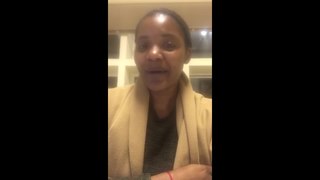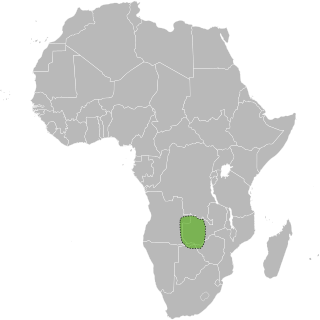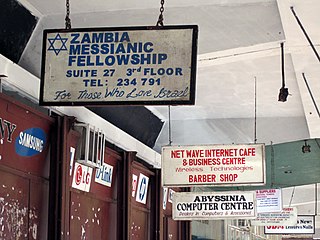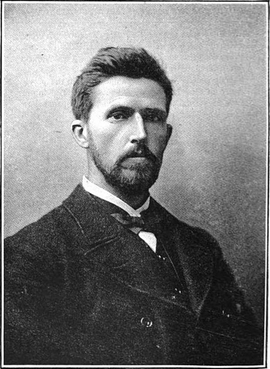Related Research Articles

Zambia, officially the Republic of Zambia, is a landlocked country at the crossroads of Central, Southern and East Africa. It is typically referred to being in South-Central Africa or Southern Africa. Its neighbours are the Democratic Republic of the Congo to the north, Tanzania to the north-east, Malawi to the east, Mozambique to the southeast, Zimbabwe and Botswana to the south, Namibia to the southwest, and Angola to the west. The capital city of Zambia is Lusaka, located in the south-central part of Zambia. The population is concentrated mainly around Lusaka in the south and the Copperbelt Province to the north, the core economic hubs of the country.
The history of Zambia experienced many stages from colonization to independence from Britain on October 24, 1964. Northern Rhodesia became a British sphere of influence in the present-day region of Zambia in 1888, and was officially proclaimed a British protectorate in 1924. After many years of suggested mergers, Southern Rhodesia, Northern Rhodesia, and Nyasaland were merged into the British Federation of Rhodesia and Nyasaland.

Lozi, also known as siLozi and Rozi, is a Bantu language of the Niger–Congo language family within the Sotho–Tswana branch of Zone S (S.30), that is spoken by the Lozi people, primarily in southwestern Zambia and in surrounding countries. This language is most closely related to Northern Sotho, Tswana (Setswana), Kgalagari (SheKgalagari) and Sotho. Lozi, sometimes written as Rotse, and its dialects are spoken and understood by approximately six per cent of the population of Zambia. Silozi is the endonym as defined by the United Nations. Lozi is the exonym.
Herman Max Gluckman was a South African and British social anthropologist. He is best known as the founder of the Manchester School of anthropology.

Lozi people, or Barotse, are a southern African ethnic group who speak Lozi and Silozi, a Sotho–Tswana language. The Lozi people consist of more than 46 different ethnic groups and are primarily situated between Namibia, Angola, Botswana, Zimbabwe including half of the north-Western and western provinces of Zambia inhabiting the region of Barotseland.

Barotseland is a region between Namibia, Angola, Botswana, Zimbabwe including half of eastern and northern provinces of Zambia and the whole of Democratic Republic of Congo's Katanga Province. It is the homeland of the Lozi people or Barotse, or Malozi, who are a unified group of over 46 individual formerly diverse tribes related through kinship, whose original branch are the Luyi (Maluyi), and also assimilated Southern Sotho tribe of South Africa known as the Makololo.

The Kololo or Makololo are a subgroup of the Sotho-Tswana people native to Southern Africa. In the early 19th century, they were displaced by the Zulu, migrating north to Barotseland, Zambia. They conquered the territory of the Luyana people and imposed their own language. The combination of Luyana and Kololo languages gave rise to the current Lozi language spoken by the Lozi people, descendants of the Luyana and nearby tribes. In 1864, the Kololo kingdom was overthrown and some chiefs moved to Chikwawa District, Malawi, with David Livingstone.

Lewanika (1842–1916) was the Lozi Litunga (King) of Barotseland from 1878 to 1916 . A detailed, although biased, description of King 'Lubossi' can be found in the Portuguese explorer Alexandre de Serpa Pinto's 1878–1879 travel narrative Como eu atravessei a África.

Zambia has several major indigenous languages, all members of the Bantu family, as well as Khwedam, Zambian Sign Language, several immigrant languages and the pidgins Settla and Fanagalo. English is the official language and the major language of business and education.

Frederick Stanley Arnot was a British missionary who did much to establish Christian missions in what are now Angola, Zambia and the Democratic Republic of the Congo (DRC).
Mulambwa Santulu was the 10th litunga (king) of Barotseland who ruled from 1780 to 1830. He is one of the most fondly remembered Luyana kings. He is famous for introducing a series of reforms such as a new constitution into the Lozi Kingdom. He has been called "Mulambwa Mutomi Wa Mulao" which translates to "Mulambwa the creator of laws."
Mulena Yomuhulu Mbumu wa LitungaYeta II Nalute was an African High Chief, king of the Lozi people and Barotseland in Zambia.

Mulena Yomuhulu Mbumu wa LitungaMwananyanda Liwale was a King of Barotseland in Zambia, very unpopular ruler.
Mulena Yomuhulu Mbumu wa LitungaMubukwanu was a High Chief of the Lozi people, King of Barotseland in Africa. He quarrelled with his brother Silumelume.
Yeta III CBE was a king of Barotseland, of the Lozi people in what is now Western Zambia.
The following is a complete list of rulers of the Mbunda Kingdom, established in the southeast of present-day Angola, covering Moxico and Cuando Cubango Provinces.
The Mbunda or Vambunda are a Bantu people who, during the Bantu migrations, came from the north to south-eastern Angola and finally Barotseland, now part of Zambia. Their core is at present found in the south-east of Angola from the Lunguevungu river in Moxico to the Cuando Cubango Province.
Mwene Chitengi Chiyengele was a Mbunda king who led his people from south-eastern Angola to Barotseland in western Zambia around 1824. The Mbunda were skilled game hunters and fighters using bow and arrow. They were welcomed by King Mulambwa of the Aluyi of Barotseland, now Western Zambia.
Nakatindi Yeta Nganga (1922–1972) was a Lozi aristocrat and Zambian politician. Jointly one of the first women elected to the National Assembly, she was also the country's first female junior minister.
References
- 1 2 Mwila Ntambi, Former nun, now mother, wife, headteacher, Zambia Daily Mail , March 16, 2018.
- ↑ Raph Uwechue (1991). "Bull, Dr Mutumba Mainga". Africa Who's who. Africa Journal Limited. p. 389. ISBN 978-0-903274-17-3.
- ↑ Roland Oliver (2013). In the Realms of Gold: Pioneering in African History. Routledge. p. 326. ISBN 978-1-134-57171-0.
- 1 2 3 4 Mutumba Mainga; Mutumba Mainga Bull (2010). Bulozi under the Luyana Kings: Political Evolution and State Formation in Pre-colonial Zambia. African Books Collective. p. 267. ISBN 978-9982-24-052-9.